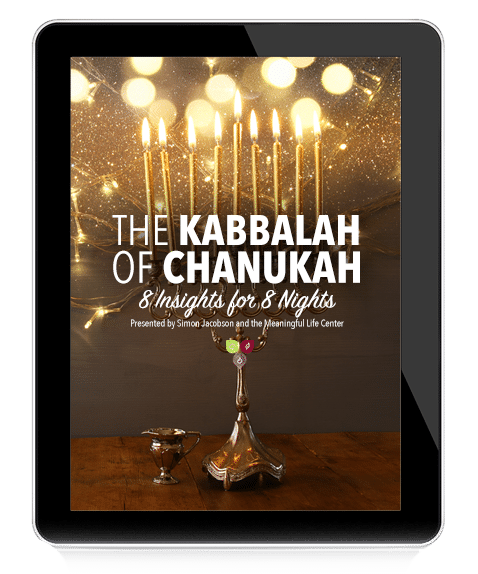Editors Note: The following three articles are based on an entry in the Rebbe’s journal dated “Chanukah 5696” (December 1935, published in Reshimot #3, pp. 10-24). The entry is a lengthy exposition on Chanukah, parts of which the Rebbe delivered at the synagogue at 17 Radzia St. in Paris, which he frequented during the years he resided in that city (1933-1940)
The Mudswamps of Hella
Chanukah celebrates the victory of Judea over Greece, of a small band of Jews over those who sought to subvert their faith and profane the sanctity of their lives.
In the course of the last four thousand years, many ideologies and cultures have sought to compromise the Jew’s allegiance to G-d and His Torah. But there is something unique about the challenge posed by the Hellenists twenty-one centuries ago—something that marks Chanukah as the ultimate triumph of spirit over matter and of light over darkness.
Soil and Water
In general, the factors that might undermine the integrity of a Jew’s faith and his commitment to G-d fall under two categories.
Most blatant are the challenges of a material sort. The Jew living in 16th-century Europe had a choice: cleave to your faith and suffer humiliation, poverty, frequent expulsion and outright slaughter, or submit to the faith of your “hosts.” Twentieth-century America offered the same choice, albeit in more “humane” terms, beckoning to the Jew to shed Shabbat, tefillin and kashrut for smoother distillation in the melting pot and enhanced access to the “American dream.” On the individual level, we are daily challenged with the choice of devoting our lives to serve our Creator and fulfill the purpose of our creation, or to pursue physical gratification and material gain.
More subtle are the ideological challenges: doctrines and philosophies that lay claim to virtue and truth, and may even espouse altruistic behavior and transcendent aims, but are utterly alien to the Jewish soul. A Jew disconnected from his roots and ignorant or unappreciative of his heritage is ready prey for the foreign waters that offer to quench his spiritual thirst.
Infinitely more noxious is a third category—doctrines that combine the soil of materialism and the wellsprings of reason into a lethal muck.
A person buried in corporeality can claw and dig his way out to sunlight. A person sinking in a sea of spurious reason can struggle to the surface and swim to shore. But he who adds water to his soil—who saturates his materialism with intellectual fluid—creates a morass from which it is infinitely more difficult to extricate himself. When his soul is moved to reach beyond the mundanity of the material, a host of rationalizations rise to still its yen; and when his mind begins to wake to the fallacy of the alien creed, the grasp of earth pulls him down. The person is thus steadily sucked down, as his efforts of both mind and will to rise above his mired state are counteracted by the bog of idealized hedonism.
Such was the challenge that faced our forefathers during the Greek domination of the Holy Land: indeed, Yavan, the Hebrew word for the Hellenic culture, means “mud.” 1 The Hellenic “reformers” did more than entice and threaten the people of Israel to embrace the body-worship of Greece; they also sought to indoctrinate them with a philosophy that exalted the physical and made its worship a virtue and an ideal. The Greek was not merely pagan; his was a paganism aestheticized by art, glorified by poetry and hallowed by reason. The Greek was no mere materialist, but one who kneaded his earthiest wants with the subliminal waters of his intellect to form a mucilage that fastened on the soul and drew it, inch by inch and limb by limb, into the quagmire of Yavan. 2
Holy Mud
Mud can be made with the putrid water of sophism. But even water from the most pristine well turns to mud when mixed with soil. Thus, our sages have said:
“If the student of Torah is meritorious, the Torah becomes an elixir of life for him; if he does not merit, it becomes a death-potion for him,”
G-d forbid. 3 The Hebrew word z’chut (“merit”) also means “refinement”; so the above statement can also be read, “If the student of Torah refines himself, the Torah becomes an elixir of life for him; if he does not refine himself, it becomes a death-potion for him.” If a person does not refine his soul, cleansing his character from the soil of its baser instincts, the pure waters of Torah become for him a mudpit of depravity: instead of buoying and nourishing his soul, his wisdom and knowledge only feed his ego, justify his iniquities, and aid his manipulation and distortion of the truth.
Therein lies the eternal lesson of Chanukah: intellect may be man’s highest faculty, but it can also be the instrument of his degradation to the lowest depths. Chanukah celebrates the cleansing of the Holy Temple from Hellenic corruption, the triumph of the pristine essence of the Jewish soul—represented by the “small, pure cruse of oil” that burned in the menorah for eight days—over the mud of Greece. We each possess such a “small, pure cruse of oil” in the pith of our souls—a reserve of supra-rational commitment to our Creator, with the power to illuminate our lives with a pure, inviolable light. A light that ensures that our search for water does not leave us mired in muck.
The Miracle
What is Chanukah? … When the Greeks entered the Sanctuary, they contaminated all its oil. Then, when the royal Hashmonean family overpowered and was victorious over [the Greeks], they searched and found only a single cruse of pure oil that was sealed with the seal of the kohen gadol (high priest)—enough to light the menorah for a single day. A miracle occurred, and they lit the menorah with this oil for eight days. The following year, they established these [eight days] as days of festivity and praise and thanksgiving for G-d.
Talmud, Shabbat 21b
Every Jewish schoolchild knows what Chanukah is. Obviously, then, the Talmud’s question “What is Chanukah?” is more than an inquiry into the history and the observances of the festival. The Talmud, explain the commentaries, is asking: “Over which miracle was it established?” 4 Many miracles, great and small, accompanied the defeat of “the mighty by the weak and the many by the few,” 5 the liberation of Israel from Hellenic dominance, and the reclaiming of the Holy Temple as the lighthouse of G-d. But there is one particular miracle, the Talmud is saying, that is the sum and substance of Chanukah: the miracle of the small cruse of pure oil that burned for eight days.
The challenge faced by the Jewish people at that time was unlike any that had confronted them before. Hellenism, a noxious blend of hedonism and philosophy, could not be resisted by the conventional tools of Jewish learning and tradition. 6 Only the “cruse of pure oil”—the supra-rational, supra-egotistical essence of the Jewish soul from which stems the Jew’s intrinsic mesirat nefesh (self-sacrificial loyalty to G-d)—could illuminate the way out of the mudswamps of Hella. Only by evoking this reserve of uncontaminable “oil” were we able to banish the pagan invader from G-d’s home and rekindle the torch of Israel as a “light unto the nations.” 7
But this was oil sufficient for but a single day. By nature, man’s highest powers flare brightly and fleetingly, soon receding to the subconscious, subbehavioral place from which they have come. When a person’s deepest self is challenged, the essential oil of his soul is stimulated, and no force on earth can still its flame; but then the moment passes, the cataclysmic fades to the routine, and the person is left with his ordinary, mortal self. 8
The miracle of Chanukah was that “they lit the menorah with this oil for eight days”—that the flame of selfless sacrifice blazed beyond a moment of truth, beyond a day of reckoning. That the “small, pure cruse of oil” burned beyond its one-day lifespan for an additional week, illuminating the seven chambers of the soul. 9 This was no mere flash of light in a sea of darkness, but a flame destined to shed purity and light for all generations, under all conditions.
Indeed, the Talmud relates that it was only on “the following year” that these eight days were established as the festival of Chanukah. A year is a microcosm of time, embodying all of time’s seasons and transmutations. 10 So it was only on the following year, after it had weathered all fluctuations of the annual cycle, that the victory of Chanukah could be installed as a permanent fixture in our lives.
The Second-Story ManThe mitzvah is to place the Chanukah lights in the outside doorway of one’s home. If one lives in a loft (i.e. on the second floor 11), he should place them in a window that faces out to the street.
Talmud, Shabbat 21b
A mitzvah is an exercise in awareness: the tefillin impress our bond with G-d upon our minds, hearts and arms; matzah is a taste of the faith that freed us from bondage and brought us to Sinai; Shabbat attunes our inner clocks to the seven-day cycle of deed and reflection that G-d imparted to His creation. While this awarenes should extend beyond the self—the imperative “to learn and to teach” 12 is basic to our mission in life—this is usually secondary to mitzvah itself, which relates primarily to a soul’s personal relationship with G-d.
But there is one mitzvah in which our effect upon others is integral to its very function: the purpose of the Chanukah lights is defined as the imperative “to publicize the miracle.” 13 Thus, the law states that the Chanukah menorah should not be lit past the hour that people who might see its light are normally out on the street, nor should it be placed where it is not readily visible to the passerby. 14 Here the mitzvah itself is the endeavor to edify and influence one’s fellows.
There are those whose lives have a doorway out to the street—whose character and temperament provide them with groundfloor access to those still outside the sphere of Torah’s light. These place their menorah “in the outside doorway of their home,” incorporating it into the passageway by which they venture out to their night-traveling brethren. Others are more inward-oriented, their talents and aptitudes leading them to a life of spirituality and seclusion. But even the most lofty saint must at least have a window out to the street in which to place his menorah. If his life’s calling precludes his stepping outdoors, he must still endeavor to shed light, opening portals in the walls of his elevated abode so that his life might illuminate the world without.
Adapted from the teachings of the Rebbe by Yanki Tauber








